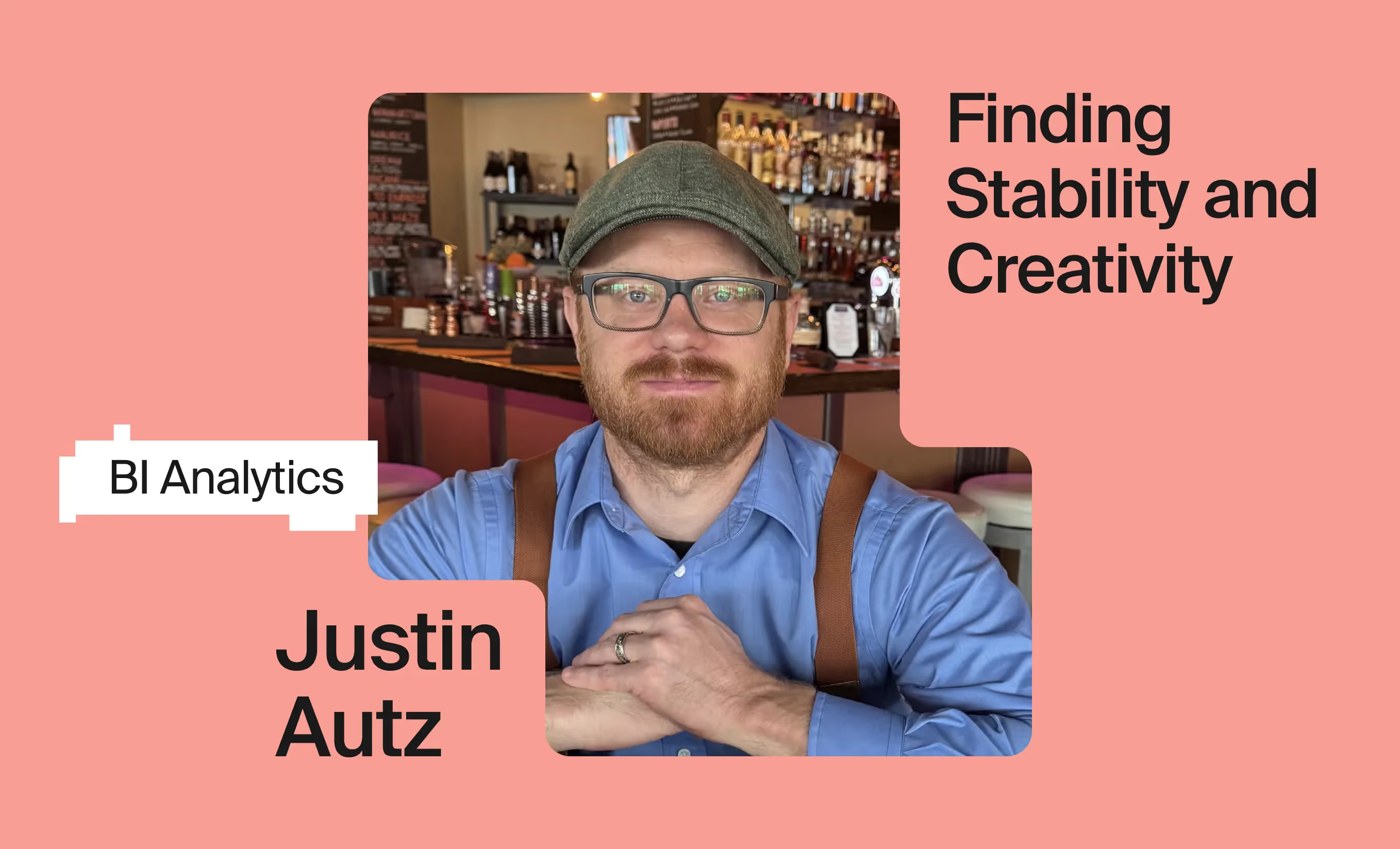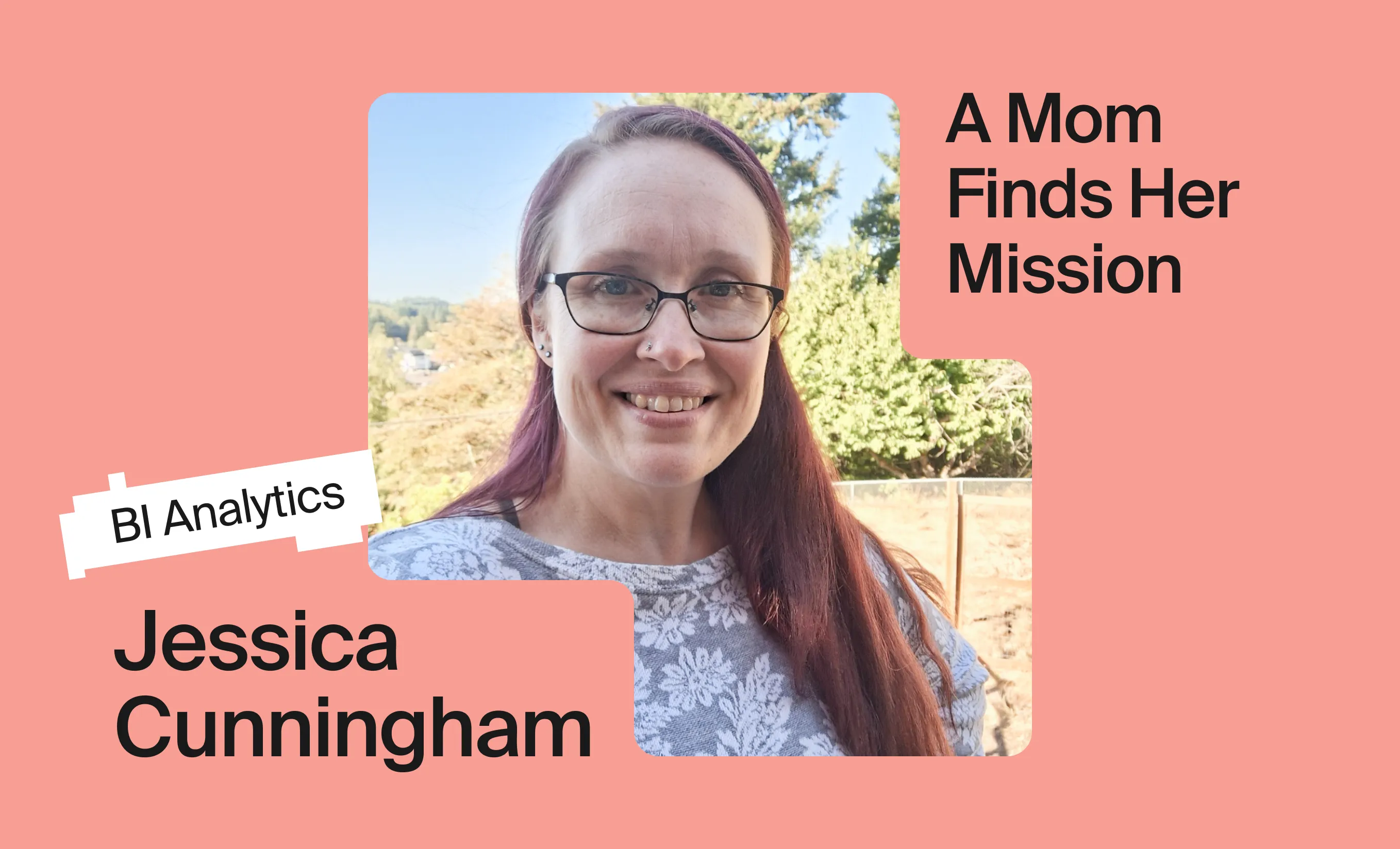It’s easy enough to fall back on cynicism and call it wisdom. Numerous cliches would back you up if you chose to go that route, too: nice guys finish last, no good deed goes unpunished, the best laid plans often go awry.
But what if all the pessimism is wrong? What if putting in the work, staying dedicated, and envisioning a brighter future for you and your family actually does work out? What if, at the end, it all ends up worth it?
Because, for Dallin Sly, it did. Here’s how his courage, tenacity, and hard work brought him to TripleTen and ultimately a career that’s allowing him to be the father he wants to be.
Getting by on gumption
Dallin was coming from a background that could have dispirited many. In high school, he switched to online classes so he could take care of his ill father. Then, when he was considering returning to learning in-person, he hit a bureaucratic snag with his credits.
Essentially, some of them wouldn’t transfer, meaning he’d have to spend an extra year studying and also go to summer school. He saw another option. “I could just go get my GED and then jump into the workforce. And that's what I ended up choosing,” he said.
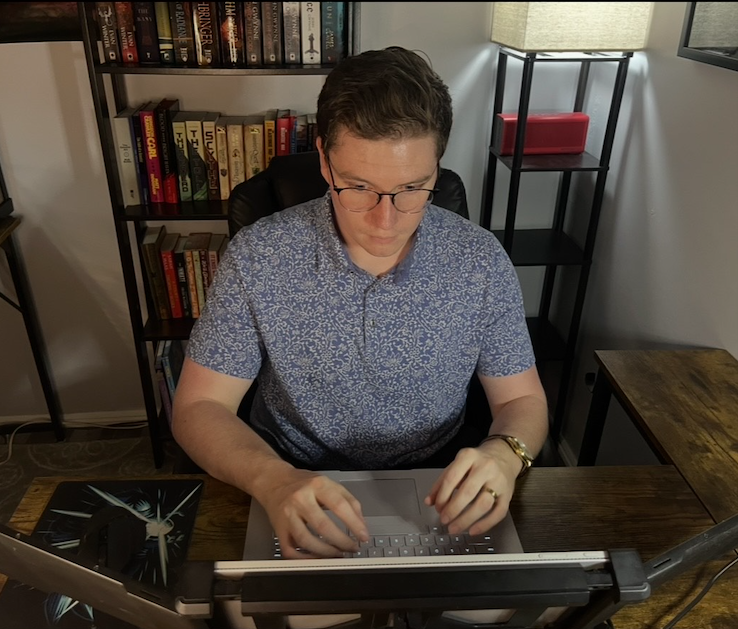
He started working in food service, but it wasn’t for him. “A restaurant's the only place they'll ask you to sell your soul for minimum wage,” he said. Following that, he spent some time as a door-to-door salesman. It also fell though, and he came back home and took a job in retail. While there, he met a woman.
“She couldn’t reach her fruit snacks, so I had to get them for her. And after that, we ended up exchanging information. And then I took her out on a couple dates, and very quickly after that, I was like, ‘Okay, I'm gonna definitely marry her.’”
So he ended up meeting her father. “Her dad never explicitly told me that I need to make money before we get married, but he very heavily implied that I needed to go figure out a way I could take care of things,” he said.
That led him to a new job moving furniture, where he was soon promoted from a helper to driver. The company even encouraged him to pursue getting his commercial driver’s license (CDL). But the work itself took a toll. “I made a really solid salary, but it was at the expense of my body. I just tore my body apart,” he said. Then COVID hit. And because he was on the injured list, he was furloughed.
Still, he was irrepressible — the CDL school stayed open, so he got the accreditation. Things seemed to be coming together, and he was about to rejoin the company with his new credentials when HR called. It turned out they weren’t going to be bringing him on. It was another hit.
Instead of giving up, he joined another company as a driver, but the new position forced him to be absent for long stretches. “I was gone for like six weeks at a time for that first role. It was brutal,” he said. “I absolutely despised leaving for so long, and it was just one of those things where I needed to figure out how to be [home] more.”
After half a year, he’d had enough and switched to regional work that allowed him to be with his family on weekends. As he progressed through these positions, he ended up taking on long hours.
It was a 60 to 70 hour work week, generally closer to 70 hours. So I still didn't see anybody because I would get home at 4 a.m., go to sleep, wake up at 11 a.m., be around for an hour or two, and then I'd have to go right back and work. Dallin Sly, TripleTen grad
It still wasn’t physically sustainable for him. “I was exhausted trucking. On paper, it's a very simple, very easy thing, but it's very stressful. There's a lot that goes into it. It's terrible on your body. I gained 85 pounds plus while I was a driver.”
He needed to cut back. He talked to his wife, and she agreed to pick up some of the slack so he could work a 40-hour schedule. That new space gave him time to think, and he started giving a career change more consideration. Specifically, he wanted to get into software engineering.
See, he’d been a door-to-door salesman with a buddy of his, and they kept talking about making the switch: “The more both of us kind of looked into it, the more we kind of started hyping each other up about it.”
Soon enough, Dallin started taking the switch more seriously. He looked into TripleTen, liked what he saw, and enrolled.
Sticking with it to find a new path
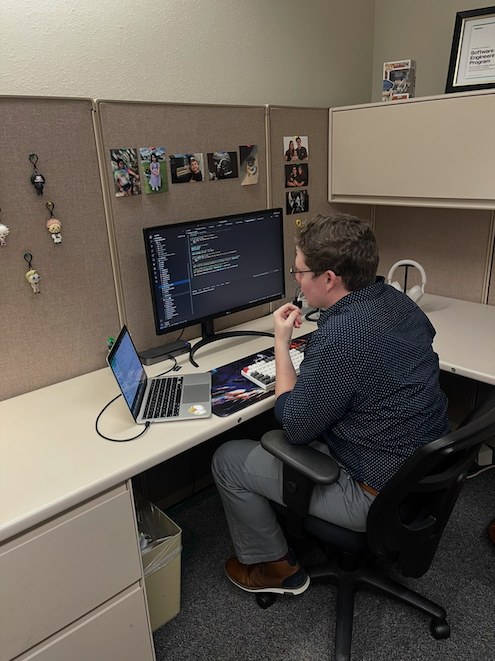
Dallin was realistic about where he was coming from. “I had absolutely no experience doing anything with computers,” he said. So he did the same thing he always did — put in a little extra work: “I took a typing class before I started TripleTen because I couldn’t even type.”
Digesting so much new material was daunting. “I always felt like I was falling behind,” he said. But, in retrospect he sees that it was just that — a feeling. “[But] looking back, I wasn't, and I was learning at the same pace as probably most other students, and I was probably right along with all the other very intelligent students that went through the course.”
See, the main hurdle wasn’t the material. “My biggest struggle was definitely just that self-doubt.” But he stuck to it and studied, staying dedicated because of his fatherly instincts that urged him to seek a transformation that could inspire his family. “I wanted to make [my kids] proud of me,” he said. “I think that was important to me.”
And when he had something he needed extra help with, the tutors were there with advice and reassurance. “I never worried about asking questions,” he said. “There wasn’t a single time I felt dumb with that.” In fact, “They reassured me that it’s a huge learning curve and the learning process is different for everybody. And they never made me feel like I should have known something that I didn’t know. So that was a great experience as well.”
So, even though he was still working full-time, he mastered the material. That meant when the final project rolled around, he was ready. It was a stark task: “I started from nothing, and there wasn't any sort of direction. It was just, ‘Here're the requirements. Meet them.’”
By drawing on all of the knowledge and skills he’d gained over his time with the bootcamp, he excelled at the project — and this flipped a mental switch for him. “That was the part where it all came together and everything made sense and fell into place.”
That self-doubt that he’d felt at the beginning? It had vanished.
I got really high marks on that last project. It felt great turning it in. Dallin Sly, TripleTen grad
Now he was ready for the next step — landing the job.
An incomparable career
As part of breaking into an entirely new industry, Dallin had crucial assistance from a career coach. “She was awesome,” Dallin said. “She was so helpful. Everything that I did, she walked me through it.”
She kept Dallin motivated and focused on doing the work that’d help him land the job. This included tasks that were foreign to him — like networking. “Having been driving for the last four or five years, being alone, and then trying to talk to as many people as possible and build relationships with as many people as I possibly could — it was a daunting task, for sure,” he said.
But he stuck with it and even started volunteering at AUTRS, a company developing a mobile app to support people with autism. All combined, this led to him giving the same energy to his search as to his education: “It was probably an equal amount of time where I was applying to jobs, sending emails, making calls, making connections on LinkedIn, trying to find extra curriculars, trying to volunteer anywhere I could.”
As part of that, he usually looked for jobs on LinkedIn, but one day, on a whim, he decided to check out Indeed. Something caught his eye.
I saw this job listing, and it just said it was with the Polk County BoCC. And I didn't even know what that was, so I was like, ‘All right, what is this?’ I clicked on it, looked into it, and, as far as the hard skills went, I checked every box. Dallin Sly, TripleTen grad
He applied and called the number listed. After bouncing through a few phone transfers, he managed to have a conversation with the person conducting the interviews. He discussed his qualifications as well as his passion for the county and its community and was put on the short list. He was told to expect an invitation for an interview. Soon enough, the email arrived, and he booked his slot.
It was a marathon three-in-one interview. He’d prepared deeply, even going so far as to read a book on SQL. But when he left the office, he was disheartened. “I felt like I bombed it because I was so nervous, and I felt like I said all the wrong things,” he said.
“I called my wife after that, and I was like, ‘I blew it. That's it.’ I was like, ‘There's nothing I could do. I tried my best, but I just couldn't get through this without blabbing on forever about nothing.’”
While working that Friday, he pulled over to a stop and noticed he’d gotten an email: “I was like, ‘Oh, there's my rejection letter.’ I clicked on the email, and the top line said, ‘Congratulations.’ I was ecstatic. I was emotional.”
It was news worth waking up a spouse for. “I was so happy all my hard work was going to pay off. I finished up my shift, I went home, and I woke my wife up at three in the morning. I was like, ‘I got it!’”
And even on his first day, he could tell the career was totally new. “It’s night and day. There’s no comparison,” he said. He did the usual first-day things — talking to management, filling in paperwork. Then, his manager came over to talk to him about one last thing. “He was like, ‘Hey, what's your schedule going to be after the probationary period?’ And I was like, ‘What? What do you mean?’”
See, all the workers needed to do was put in 40 hours a week, but how they went about that could vary. People could do eight hours for five days, or they could do four days of ten hours. Whatever worked for them. In addition, they could telecommute for two days a week. After a career defined by strict and onerous hours, it was something totally new for Dallin. “I was so confused by that concept,” he said. But he’s fully embraced it.
I'm able to spend more time with my family. My wife's pregnant right now, and being able to be there for her, take care of her through this pregnancy, is special. Because for those first two, I was gone for a lot of it. Dallin Sly, TripleTen grad
And while the flexible schedule might have come as a surprise, his tasks haven’t: “I was more ready than I thought I would be. I've been able to hit the ground running. I've been able to get tickets done. I've been able to contribute more than I thought I'd be able to right away. So it's been awesome.”
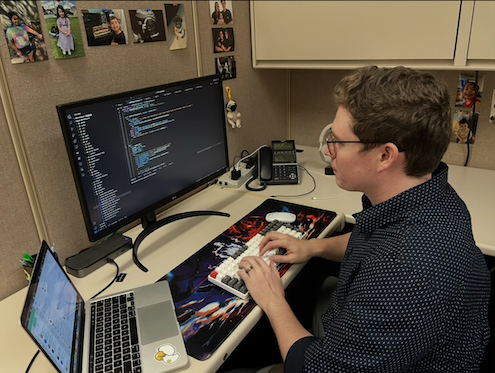
And over his first week in his new position as Programmer Analyst at the Polk County BoCC, he discovered that the schedule and his tasks weren’t the only perks. In fact, he’s now found all his hard work paying off with the job he’d been aspiring to all along.
“I got to meet the rest of my team, and they're just the best people I've ever met. They're all so down to earth, kind, and so willing to help. I don't think I could have found a better place to have my first job at,” he said.
Postscript: Helping his community
Usually, we’d leave the story there, but Dallin did even more that deserves mention, too.
The name “Polk County” might ring a bell. It was recently in the news as one of the locations hit hard by Hurricane Milton. Since he worked for the county, he also showed up to help those affected. “I spent 30 hours straight at the shelter the day that it hit. And then after that, I went back for another 12 hours.”
Read more of our grads’ stories
Want to check out more career transformations? Dive into more success stories here.









.webp)



